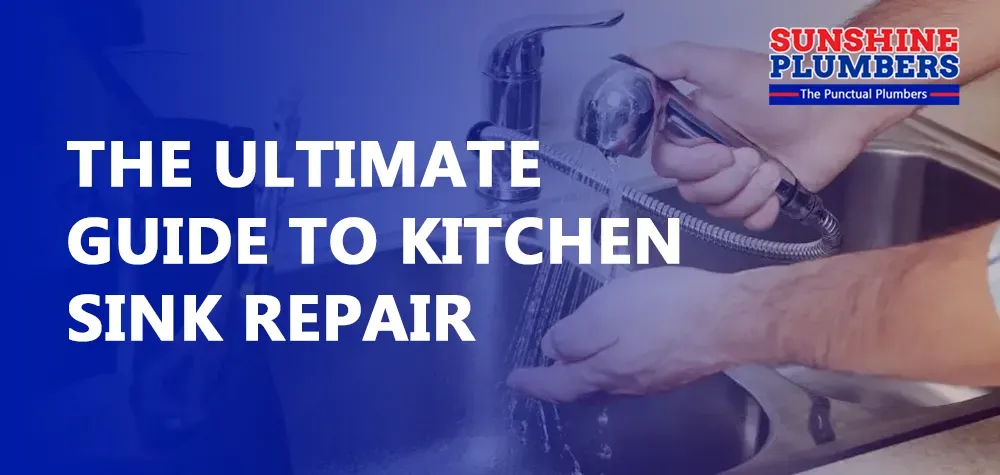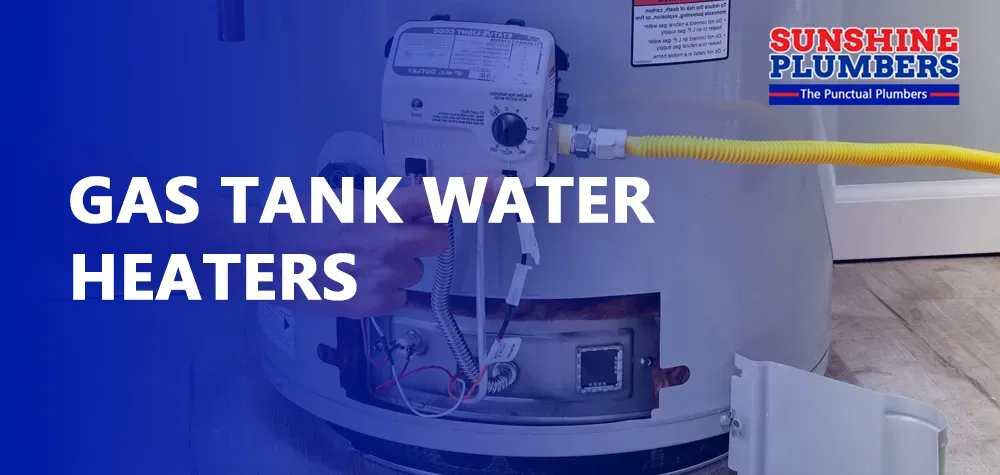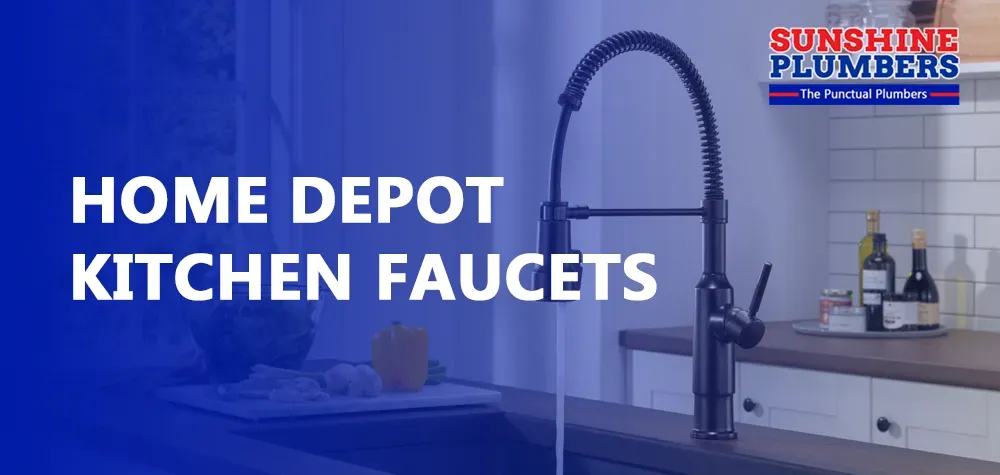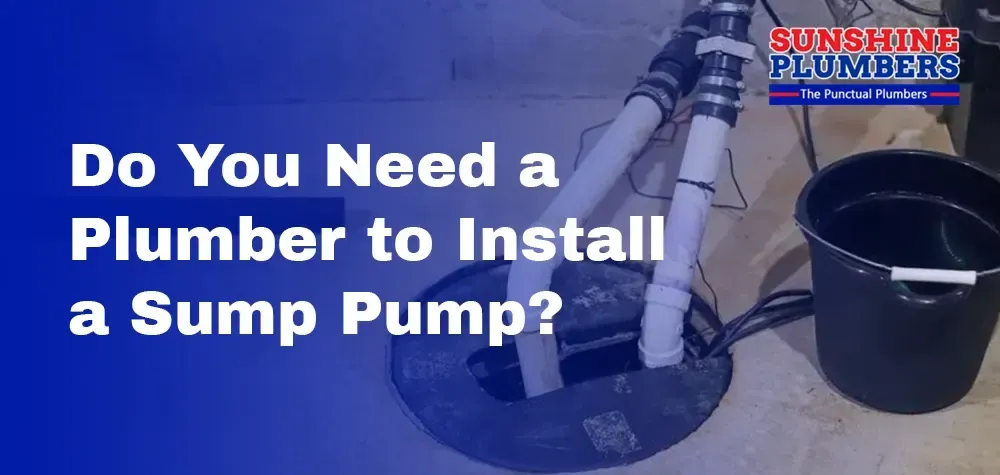Do You Need a Plumber to Install a Sump Pump? Unveiling the Expert Insight
When it comes to safeguarding your home against water damage, a sump pump is often a homeowner's first line of defense. However, the question that often arises is, "Do you need a plumber to install a sump pump?" This comprehensive guide, brought to you by Sunshine Plumbers, dives into the intricacies of sump pump installation, providing expert insights to empower homeowners in making informed decisions.
The Importance of a Sump Pump
A sump pump is crucial in safeguarding homes from potential water damage, particularly in areas prone to flooding or with high groundwater levels. These are key aspects highlighting the importance of a sump pump:
- Water Accumulation Prevention:
- The primary function of a sump pump is to prevent the accumulation of water in the basement or crawl space. It does so by redirecting water away from the foundation of the house, helping to maintain a dry and secure environment.
- Flood Prevention:
- In areas susceptible to heavy rainfall or flooding, a sump pump acts as a reliable defense mechanism against water entering the lower levels of the home. Pumping excess water out of the sump pit prevents potential flooding that could lead to extensive damage.
- Protection Against Structural Damage:
- Prolonged exposure to water can cause serious structural damage to a home's foundation. A sump pump actively works to keep the foundation dry, mitigating the risk of cracks, erosion, and other issues that can compromise the structural integrity of the building.
- Prevention of Mold and Mildew:
- Damp and humid basement conditions create an ideal mold and mildew growth environment. By effectively managing water levels, a sump pump helps prevent the development of these harmful and potentially hazardous substances, promoting a healthier indoor environment.
- Preservation of Valuables:
- Basements often house valuable items, from stored belongings to appliances and utility systems. A sump pump safeguards these valuables by reducing the risk of water damage, ensuring that the lower levels of the home remain a secure and usable space.
- Insurance Against Emergency Situations:
- During severe weather events or unexpected plumbing failures, a sump pump provides extra protection. Its automatic operation ensures a swift response to rising water levels, offering homeowners peace of mind in the face of unforeseen emergencies.
In essence, a sump pump serves as a proactive measure to prevent water-related issues, preserving the integrity of a home and its contents. Regular maintenance and professional installation enhance the reliability of this critical component in home protection.
DIY vs. Professional Installation
Pros and Cons of DIY Sump Pump Installation
Pros:
- Cost Savings:
- One of the primary advantages of a DIY installation is potential cost savings. Homeowners can avoid labor fees by tackling the project themselves, making it a budget-friendly option.
- Personalized Schedule:
- DIY installations allow homeowners to work at their own pace and on their schedule. This flexibility can be advantageous for those with time constraints or specific preferences.
- Learning Experience:
- Installing a sump pump DIY-style provides an opportunity to learn more about the home's plumbing system. It can be a rewarding experience for those interested in understanding and working on household infrastructure.
Cons:
- Technical Complexity:
- Sump pump installation involves technical aspects such as electrical wiring, plumbing connections, and accurate pump placement. Without the necessary expertise, DIYers may encounter challenges that can lead to incorrect installations and potential system failures.
- Time-Consuming:
- DIY installations often take longer than those performed by professionals. Lack of experience can result in prolonged troubleshooting and adjustments, extending the time it takes to complete the project.
- Limited Warranty Protection:
- Manufacturers typically offer warranties for sump pumps when professionally installed. DIY installations may not qualify for the same level of warranty protection, leaving homeowners responsible for potential repairs or replacements.
Pros and Cons of Professional Sump Pump Installation
Pros:
- Expertise and Experience:
- Professional plumbers possess the necessary expertise and experience to navigate the technical intricacies of sump pump installation. Their knowledge ensures correct placement, wiring, and plumbing connections for optimal performance.
- Time-Efficiency:
- Professionals can complete the installation efficiently, reducing downtime and minimizing the risk of errors. Their experience allows for swift and accurate execution of the project.
- Warranty Coverage:
- Many manufacturers provide extended warranties for sump pumps installed by certified professionals. This warranty coverage offers added protection and peace of mind for homeowners in the event of potential issues.
Cons:
- Cost Investment:
- Opting for professional installation incurs labor costs, making it a more significant initial investment compared to a DIY approach. However, this cost may be justified by the expertise and warranty coverage provided.
- Dependence on Scheduling:
- Homeowners may need to align their schedules with the availability of professional plumbers, potentially causing delays in the installation process.
In summary, while DIY installations offer potential cost savings and a personalized approach, professional services provide expertise, efficiency, and warranty coverage. The choice between the two depends on the homeowner's skill level, time availability, and willingness to invest in professional assistance for a critical home protection system.
Complexities of Sump Pump Installation
Sump pump installation involves a series of complexities that require careful consideration and technical expertise. Here are key aspects highlighting the intricacies of the installation process:
- Accurate Sump Pit Placement:
- The proper placement of the sump pit is crucial for effective water drainage. Determining the optimal location involves assessing the basement's layout, and groundwater entry points, and ensuring it aligns with the natural flow of water.
- Electrical Wiring and Power Source:
- Sump pumps require a reliable power source. Installing the necessary electrical wiring and ensuring a proper connection to the home's electrical system is essential. This step demands a good understanding of electrical work to avoid safety hazards.
- Correct Pump Selection:
- Choosing the right type and size of the sump pump is critical for its efficiency. Factors such as the basement size, water volume, and potential discharge height need to be considered to prevent pump overload or inadequate water removal.
- Precise Plumbing Connections:
- Connecting the sump pump to the drainage system involves intricate plumbing work. Achieving watertight connections and proper alignment with existing plumbing infrastructure requires expertise to prevent leaks and ensure optimal functionality.
- Check Valve Installation:
- A check valve is essential to prevent water from flowing back into the sump pit after the pump cycles. Installing this valve correctly is crucial for the pump's longevity and preventing unnecessary wear and tear.
- Backup System Integration:
- Including a backup system for power outages or pump failures adds another layer of complexity. Integrating a battery backup or water-powered pump requires careful planning and installation to ensure seamless functionality during emergencies.
- Gravel and Drainage Considerations:
- Properly layering the sump pit with gravel facilitates efficient water flow to the pump. Additionally, ensuring proper drainage away from the foundation is vital to prevent water from re-entering the basement.
- Permit and Code Compliance:
- Sump pump installations often require compliance with local building codes and may necessitate obtaining permits. Understanding and adhering to these regulations is essential to ensure a legal and safe installation.
Benefits of Professional Sump Pump Installation
Opting for professional sump pump installation offers a range of benefits that contribute to the effectiveness and longevity of the system. Here are the key advantages:
- Expertise and Precision:
- Professional plumbers bring extensive knowledge and expertise to sump pump installations. Their experience allows for precise placement, accurate sizing, and meticulous connection of components, ensuring optimal functionality.
- Efficiency and Time-Saving:
- Professionals can complete the installation efficiently, reducing the time it takes to set up the system. Their familiarity with the intricacies of the process minimizes the risk of errors and streamlines the overall installation timeline.
- Correct Pump Selection:
- Choosing the right type and size of the sump pump is crucial for its efficiency. Professional plumbers assess factors such as the basement size, water volume, and potential discharge height to select the most suitable pump for the specific needs of the property.
- Warranty Coverage:
- Many manufacturers offer extended warranties for sump pumps installed by certified professionals. This warranty coverage provides added protection and peace of mind for homeowners, as any potential issues can be addressed under the terms of the warranty.
- Compliance with Regulations:
- Professional plumbers are well-versed in local building codes and permit requirements related to sump pump installations. They ensure that the installation adheres to these regulations, avoiding potential legal issues and ensuring the system meets safety standards.
- Backup System Integration:
- Professionals can seamlessly integrate backup systems, such as battery backups or water-powered pumps, to enhance the reliability of the sump pump during power outages or equipment failures. This additional layer of protection is crucial for emergencies.
- Avoidance of Common Pitfalls:
- Professional installers have encountered various challenges in sump pump installations and possess the skills to avoid common pitfalls. This includes ensuring proper gravel layering, correct check valve installation, and addressing potential drainage issues.
- Customized Solutions:
- Each property may have unique considerations that affect the installation process. Professional plumbers can provide customized solutions based on the specific characteristics of the home, ensuring a tailored approach that meets individual needs.
Unlock Plumbing Excellence with Sunshine Plumbers
Embark on a journey of plumbing perfection with Sunshine Plumbers as your trusted partner. Beyond mastering sump pump installations, our seasoned experts stand ready to transform your plumbing experiences into seamless, efficient, and aesthetically pleasing solutions. Whether you're facing challenges with sump pumps, seeking upgrades, or encountering any plumbing concerns, our commitment to excellence shines through every project. From transparent communication to reliable solutions, we prioritize your satisfaction at every turn. Why choose Sunshine Plumbers? Our team combines skill with a passion for precision, ensuring your plumbing needs are not only met but exceeded. Contact us today, and let our expertise bring sunshine to your plumbing projects!




